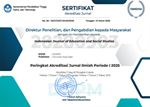Allen, F., & Santomero, A. M. (2021). What Do Financial Intermediaries Do? Journal of Banking & Finance, 25(2), 271–294. https://doi.org/10.1016/S0378-4266(99)00129-6
Benson, G. S., McIntosh, C. K., Salazar, M., & Vaziri, H. (2020). Cultural Values and Definitions of Career Success. Human Resource Management Journal, 30(3), 392–421. https://doi.org/10.1111/1748-8583.12266
Broby, D. (2021). Financial Technology and The Future of Banking. Financial Innovation, 7(1), 1–19. https://doi.org/10.1186/s40854-021-00264-y
Celik, Y., Talo, M., Yildirim, O., Karabatak, M., & Acharya, U. R. (2020). Automated Invasive Ductal Carcinoma Detection Based Using Deep Transfer Learning with Whole-Slide Images. Pattern Recognition Letters, 133, 232–239. https://doi.org/10.1016/j.patrec.2020.03.011
Dewi, R., Azis, M., Rauf, A., Sahabuddin, R., & Karim, A. (2022). Empowering Communities on the Feasibility of Local Chicken Livestock Business in South Sulawesi Province, Indonesia. Specialusis Ugdymas, 1(43), 11034–11045.
Fox, J., & Bartholomae, S. (2020). Household Finances, Financial Planning, and Covid‐19. Financial Planning Review, 3(4), e1103. https://doi.org/10.1002/cfp2.1103
Haenlein, M., Anadol, E., Farnsworth, T., Hugo, H., Hunichen, J., & Welte, D. (2020). Navigating the New Era of Influencer Marketing: How to be Successful on Instagram, TikTok, & Co. California Management Review, 63(1), 5–25. https://doi.org/10.1177/0008125620958166
Isenberg, S. R., Killackey, T., Saunders, S., Scott, M., Ernecoff, N. C., (2021). “Going Home [is] Just A Feel-Good Idea with No Structure”: A Qualitative Exploration of Patient and Family Caregiver Needs When Transitioning From Hospital to Home in Palliative Care. Journal of Pain and Symptom Management, 62(3), e9–e19. https://doi.org/10.1016/j.jpainsymman.2021.02.026
Latifah, E. (2022). Financial Management with the Sakinah Finance Model for Coastal Communities. Asian Journal of Management Analytics, 2(1), 97–108. https://doi.org/10.55927/ajma.v2i1.1466
Lee, J. (2020). Access to Finance for Artificial Intelligence Regulation in The Financial Services Industry. European Business Organization Law Review, 21, 731–757. https://doi.org/10.1007/s40804-020-00200-0
Li, Y. (2021). Analysis on the Functions of Financial Intermediary. 2021 3rd International Conference on Economic Management and Cultural Industry (ICEMCI 2021), 152–155. Atlantis Press. https://doi.org/10.2991/assehr.k.211209.024
Liu, S., & Wang, B. (2022). The Decline in Agricultural Share and Agricultural Industrialization—Some Stylized Facts and Theoretical Explanations. China Agricultural Economic Review, 14(3), 469–493. https://doi.org/10.1108/CAER-12-2021-0254
Metawea, M. S. (2020). The Role of Financial Institutions in Supporting Entrepreneurial Success: Case of Egypt. American Journal of Business and Operations Research, 1(1), 36–51. https://doi.org/10.54216/AJBOR.010104
Mohammadpoor, M., & Torabi, F. (2020). Big Data Analytics in Oil and Gas Industry: An Emerging Trend. Petroleum, 6(4), 321–328. https://doi.org/10.1016/j.petlm.2018.11.001
Ningish, P. A., Mukhlisin, M., & Nelli, J. (2022). Family Financial Management in Realizing Sakinah Family. In Wealth Management and Investment in Islamic Settings: Opportunities and Challenges (pp. 151–164). Springer. https://doi.org/10.1007/978-981-19-3686-9_10
Park, H., & Kim, J. D. (2020). Transition Towards Green Banking: Role of Financial Regulators and Financial Institutions. Asian Journal of Sustainability and Social Responsibility, 5(1), 1–25. https://doi.org/10.1186/s41180-020-00034-3
Patel, P. C., Lenka, S., & Parida, V. (2022). Caste-based Discrimination, Microfinance Credit Scores, and Microfinance Loan Approvals among Females in India. Business & Society, 61(2), 372–388. https://doi.org/10.1177/0007650320982609
Pomeroy, R., Arango, C., Lomboy, C. G., & Box, S. (2020). Financial Inclusion to Build Economic Resilience in Small-Scale Fisheries. Marine Policy, 118, 103982. https://doi.org/10.1016/j.marpol.2020.103982
Prosek, E. A., & Gibson, D. M. (2021). Promoting Rigorous Research by Examining Lived Experiences: A Review of Four Qualitative Traditions. Journal of Counseling & Development, 99(2), 167–177. https://doi.org/10.1002/jcad.12364
Ratnawati, K. (2020). The Influence of Financial Inclusion on MSMEs’ Performance through Financial Intermediation and Access to Capital. The Journal of Asian Finance, Economics and Business (JAFEB), 7(11), 205–218. https://doi.org/10.13106/jafeb.2020.vol7.no11.205
Sabri, M., Wijekoon, R., & Rahim, H. (2020). The Influence of Money Attitude, Financial Practices, Self-Efficacy and Emotion Coping on Employees’ Financial Well-Being. Management Science Letters, 10(4), 889–900. https://doi.org/10.5267/j.msl.2019.10.007
Salignac, F., Hamilton, M., Noone, J., Marjolin, A., & Muir, K. (2020). Conceptualizing Financial Wellbeing: An Ecological Life-Course Approach. Journal of Happiness Studies, 21, 1581–1602. https://doi.org/10.1007/s10902-019-00145-3
Schoch, K. (2020). Case Study Research. Research Design and Methods: An Applied Guide for the Scholar-Practitioner, 245–258.
Sharma, A., Pathak, S., Borah, S. B., & Adhikary, A. (2020). Is It Too Complex? The Curious Case of Supply Network Complexity and Focal Firm Innovation. Journal of Operations Management, 66(7–8), 839–865. https://doi.org/10.1002/joom.1067
Swiecka, B., Yeşildağ, E., Özen, E., & Grima, S. (2020). Financial Literacy: The Case of Poland. Sustainability, 12(2), 700. https://doi.org/10.3390/su12020700
Xiao, J. J., & Tao, C. (2021). Consumer Finance/Household Finance: The Definition and Scope. China Finance Review International, 11(1), 1–25. https://doi.org/10.1108/CFRI-04-2020-0032
 (Sekolah Tinggi Ekonomi dan Bisnis Islam Badri
Mashduqi)
(Sekolah Tinggi Ekonomi dan Bisnis Islam Badri
Mashduqi) 



